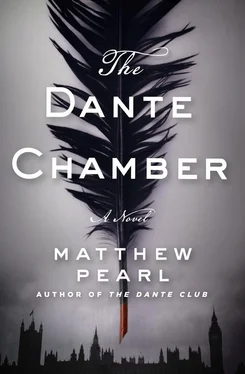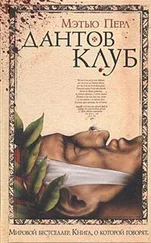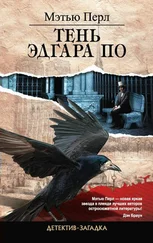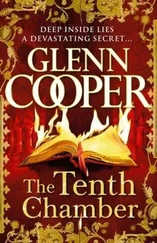He meant the word Sibbie’s lips seemed to be forming when Christina last looked upon her. Christina knew that most people, in fact perhaps it was not too bold to say anybody other than her , would have spent countless hours guessing at the word Sibbie seemed to intone in Christina’s last glimpse of her. But not Christina. She threw down a steel door in her mind, willed herself to not pay any attention to it at all, defended herself from falling into any trace of obsession with Sibbie, who was born to absorb obsessions.
What most startled Christina about the question was that she had never told Gabriel she had seen Sibbie move her lips in what seemed to be silent speech. Or had she, and in the hurry and confusion of all that had happened, now forgot that she had? She considered how her parents would address a question such as Gabriel’s. Father would expound on its mysteries and meanings, and Mother would ignore it altogether. She chose her mother’s technique.
As Gabriel recovered, he spent much of his time tending to his assorted animals. Top, his wombat, died suddenly, and Gabriel held a funeral in the garden with half a dozen artist friends and Christina present. He broke down and cried hysterically over the creature before it was interred beneath his lime tree, so Christina read to the gathering the poem he’d written for the occasion:
My burning soul; neither from owl nor from bat
Can peace be to me now
That I’ve lost my wombat.
He also painted. Gabriel painted as much as Christina could remember him painting in recent years. This pleased her whenever she thought about it. On the surface, they were typical paintings of Gabriel’s, the kind that inspired passion from patrons and many artists, and anger from certain critics who thought them undisciplined and confusing. There were shimmering women in red and gold hues. There were heroic men on the threshold of dangerous actions. The paintings were windows, in other words, to a time and place when life could be redeemed by beauty, rumination, and sacrifice.
She observed small changes in his art — flames and sparks in odd places; death, when depicted, seemed something final and alarming, rather than something awe-inspiring and capable of regeneration. She hesitated to raise any of this with Gabriel, wondering if he even noticed. Perhaps, she thought, it was not his art that had changed; perhaps she had.
“In the past,” Gabriel mused in a low voice, indirectly addressing some of his techniques, “my painting tormented me more than I admit. Lately I feel I can paint by a set of rules, which I could teach to any man as systematically as one teaches arithmetic. In painting, dear sister, there is in the less important details something of the craft of a superior carpenter, and the part of a picture that is not mechanical is often trivial enough.”
Most surprising, he finally finished Dante’s Dream , which he had wrestled with for more than fifteen years. It was seven by ten feet, a massive accomplishment both in size and effect. When he unveiled it to his siblings with a twinkle in his eye, Christina stared into the face of the dying Beatrice until she realized she no longer looked like either of the two women who’d modeled for the painting over the years; nor did she look quite like Lizzie, whose likeness Gabriel often painted without realizing it; nor did she resemble Sibbie, the latter of whom had intruded into some of the new paintings. She felt a moment of relief that perhaps in some small way he had been unlatched from the women of his past, but then she wondered if it signaled a search for a new influence yet to be found. The painting was remarkable for its beauty and the fact that it inspired feelings, not thoughts. He seemed so lighthearted about finishing that she didn’t think to ask about the face of Beatrice.
“I should not count on a reception from the bloody critics that it deserves,” Gabriel said as a kind of warning as he paced the studio back and forth studying the work, growing angry at the idea. “No. This conspiracy to persecute me — well, what remains to be said about it — is widespread and remorseless. Bedevilments thicken.”
She assured him that no such conspiracy existed, but he had stopped to stare out the floor-to-ceiling mullioned window to the Thames beyond, where the sail of a lone boat fluttered under heavy storm clouds. Peals of thunder reached the studio.
“Tennyson, that perpetual groan. And Browning! A dandy bloodsucker. Those two sprout a new horn, hoof, tusk, or tail at every step.”
“What on earth do you mean? They and Dr. Holmes helped you, Gabriel,” Christina said. “They helped me — us.”
Lightning flashed around the figure of Gabriel, whose back was facing her, momentarily filling the room with the long shadow of his body. “They wished to discredit me, my dear Christina. No, I am home at last, and never shall I leave it again.”
One afternoon, when she arrived at Tudor House, she found Gabriel walking up and down the stairs.
“Did you ever notice,” he asked in his velvety voice, “what a slopperty walk I have? Just look at it. Look! Like a sailor’s. My legs are too far apart.”
“You look well,” Christina said, the closest she could come to asking him how he felt.
“Without the chloral I fear my old curse will return before long — insomnia.”
“Without the chloral, we will have you healthy and content for years to come. As you can tell, I am turning quite into an old nurse.”
“By the by, I’m thinking of buying a nice ticker,” Gabriel said, miming pulling a watch chain out of his vest and studying the invisible watch, satisfied at the imaginary time on it. “To know the time — sometimes that would help. I have seen one I admired last week. But I don’t have the tin. Fifteen pounds...”
“I will loan it to you, Gabriel,” Christina said.
“Will you? I will pay you back, of course, sooner than you think.”
Christina knew he never would. He was overjoyed about the idea of a watch for the next day and a half.
Before they left for a walk that same afternoon, she noticed he had written three words on a piece of paper and pinned it on his wall, as a kind of motto, she supposed.
Frangas non Flectes.
It translated as: You may break but shall not bend me. A few weeks later, he’d printed this on Tudor House stationery.
Life continued to pile up its demands on Christina while they had been occupied in such unusual endeavors. She had to oversee various repairs and projects for the house she shared with her mother, brought on by the year’s late snowstorms. She had letter after letter, personal and professional, to answer, always copying her response, then periodically burning the bundle.
(Later biographers, after Christina Rossetti took her place among the most celebrated poets of the nineteenth century, would find the first half of 1870 a puzzle in chronicling her life, with so few extant documents and with police records referencing the Rossettis by that point either suppressed or destroyed. Christina, most biographers surmised, probably spent those months holed up at home, suffering from a stretch of feeble health.)
Charles Cayley, who had to be abroad to work on a translation to which he had committed, wrote to Christina that he wished to hear from her as soon as possible about their last, unfinished conversation. She did not know exactly how to reply, so she wrote of the weather, of the death of the Tudor House wombat, of a trip abroad she was planning with her mother and aunts, of her work at Saint Mary’s, and some new efforts she had joined to combat cruelty to animals. She also found herself writing a poem to enclose to him:
Читать дальше












